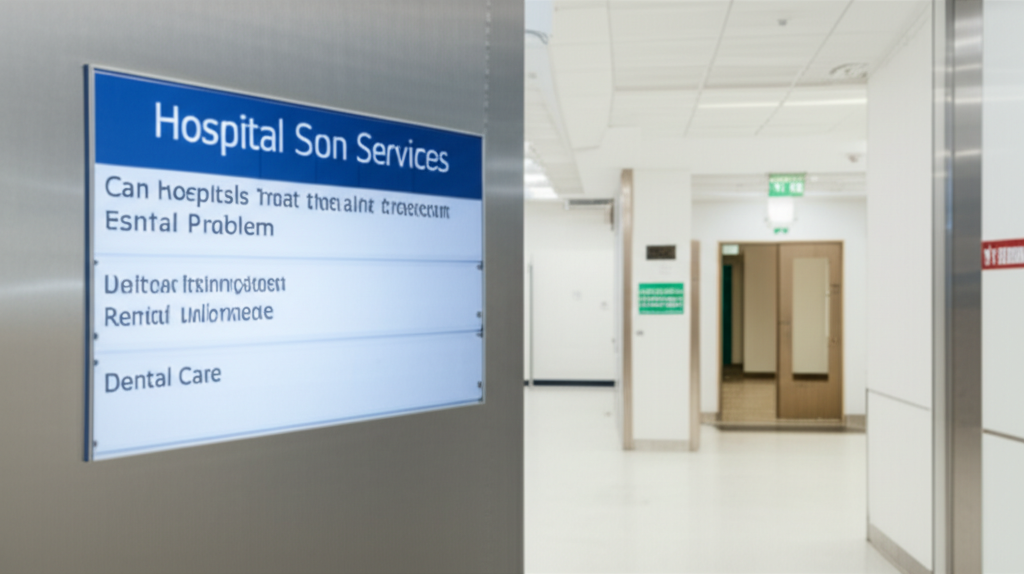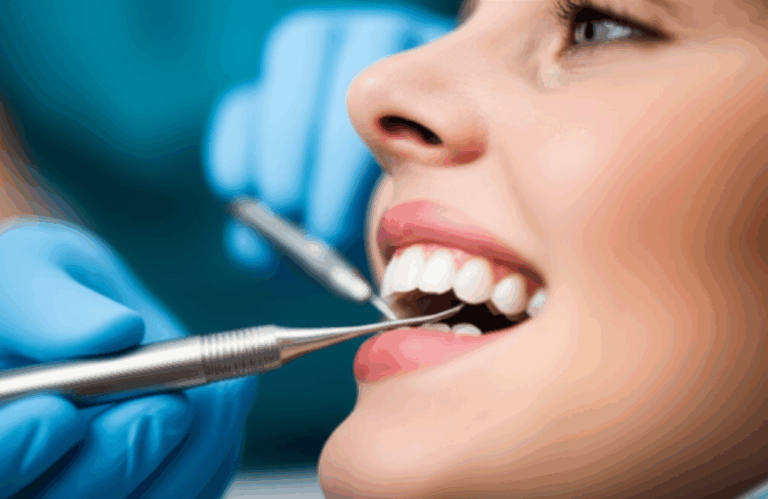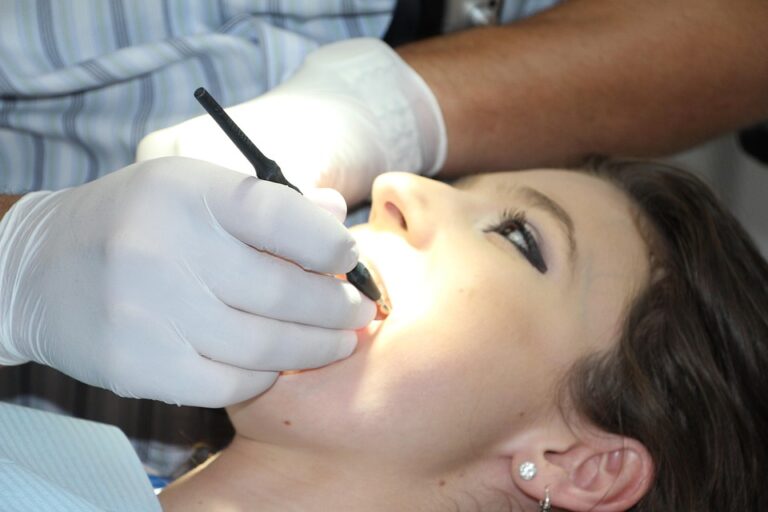
Can Hospitals Treat Dental Problems? Your Guide to Dental Emergencies and Hospital Care
That throbbing toothache wakes you in the middle of the night. Or maybe your child falls and cracks a tooth at the park, blood and tears everywhere. It’s scary, it’s painful, and your first thought is often the same: Should you go to the hospital? Will they even help with dental problems?
If you’ve ever been caught in that moment of panic or pain and wondered where to turn, you’re not alone. Many people—especially outside regular dental hours—aren’t sure when a hospital is the right choice for tooth trouble, what kind of care you can expect there, or how it compares to seeing a dentist.
This article is here to answer those worries in a simple, caring way. You’ll find everything you need to know about when hospitals get involved in dental care, what kind of dental emergencies need a hospital trip, and how to make the best, safest choice for your mouth and your health.
In This Article
What We’ll Cover:
- When Should You Go to the Hospital for Dental Problems?
- What Dental Issues Can Hospitals Handle?
- The Difference Between the ER and a Hospital Dental Department
- What To Expect At the Hospital
- When Not to Visit the Hospital (And Where To Go Instead)
- The Cost and Insurance Landscape for Hospital Dental Care
- How to Find Hospital Dental Services (and What To Prepare)
- Key Takeaways for Your Dental Emergency Plan
When Should You Go to the Hospital for Dental Problems?
Let’s start with the real question you might have: “Is my tooth problem bad enough for a hospital visit?”
Most dental issues—think small cavities, chipped teeth, lost fillings, or aching gums—are best handled by a dentist or an urgent care dental clinic. But hospitals and emergency rooms (ERs) are definitely needed for certain severe, urgent situations.
Here’s when you should head to the hospital or ER for a dental emergency:
1. Severe Swelling or Infection That’s Spreading
If you notice swelling around your jaw, face, or neck, especially if it’s starting to close your eye, or if swallowing and breathing become difficult, don’t wait. These can be signs of a dental abscess (a pocket of pus from an infection in your tooth or gums) that’s spreading. Such infections can quickly become serious and put your life in danger.
- What to watch for: Fever, chills, a fast heartbeat, red streaks on the skin, trouble swallowing, or feeling faint.
2. Major Injury (Broken Jaw, Knocked-Out Tooth, Severe Bleeding)
Sudden injuries—like a hard fall, car accident, or sports mishap—can break teeth, move your jaw out of place or break it, or lead to a lot of bleeding.
- Go to the hospital right away if you see exposed bone, your teeth are knocked out completely, or you can’t stop bleeding after 15 minutes of holding steady pressure on it.
3. Unbearable Tooth or Jaw Pain
If pain is so bad that you can’t sleep, eat, or go about your day—and no over-the-counter medicine helps—you might need stronger pain relief from the hospital, especially if you also have an infection or swelling.
4. Difficulty Breathing or Swallowing
It cannot be stressed enough: if a dental problem is making it hard for you to breathe or swallow, treat it as a medical emergency and go to the ER. Getting help fast could save your life.
What Dental Issues Can Hospitals Handle?
So, what can the ER or a hospital dental department really do for you? Here’s a breakdown:
Emergency Room (ER): The First Line of Defense
Most hospitals will start you off in the ER or urgent care. But here’s the thing—most ERs don’t have dentists or special tooth-fixing tools. Their main job is to handle life-threatening symptoms, manage severe pain, stop bleeding, and get you stable so you can see a dentist later.
Common emergency dental issues treated in ERs:
- Abscesses and facial cellulitis (spreading infections)
- Knocked-out or broken teeth (if quick action can save the tooth)
- Jaws that are out of place or broken
- Severe, unstoppable bleeding from the mouth
- Major mouth and face injuries
- First-step pain relief for pain you can’t manage
What ERs usually can’t do:
- Fill cavities, place crowns, or do root canals
- Give you a permanent new tooth
- Treat gum disease (besides giving medicine for infection or pain)
Oral and Maxillofacial Surgery Departments (OMFS): Hospital Dentistry’s Heavy Hitters
Some larger hospitals, children’s hospitals, and university medical centers have special teams for complex dental and facial problems. Special dentists called oral surgeons treat the toughest cases that need hospital resources—like operating rooms, anesthesia, and a full medical team.
Services they manage:
- Complicated tooth removals (like wisdom teeth while you are fully asleep)
- Repair of major face and jaw injuries (broken bones, deep cuts)
- Treatment for mouth cancers
- Cleft lip and palate repairs
- Dental surgery for people with other serious health problems (heart conditions, bleeding disorders, immune issues)
- Managing dental infections that have spread deep into the face or neck
Hospital-Based Dental Clinics (Less Common, But Important)
Some hospitals (especially public or teaching hospitals) have their own dental clinics that help:
- People with serious medical issues (cancer, transplant, heart disease)
- Patients with special needs (autism, severe fear of the dentist, or developmental disabilities)
- Cases that need special imaging, sedation, or care from a team of different doctors
These clinics often handle complex root canals, fixing artificial teeth, or even making dental prosthetics for cases where parts of the mouth or face need to be rebuilt. They sometimes work with outside dental labs such as a dental ceramics lab or digital dental lab for making crowns, bridges, or dentures.
Key Takeaway:
Hospitals are set up to handle:
- Severe infections, major injuries, bleeding, and bad pain.
- Complex, medically risky, or surgical cases.
But they are not a replacement for your regular dentist.
The Difference Between the ER and a Hospital Dental Department
You might be wondering—if the ER can handle emergencies, what’s the point of a special hospital dental department? Let’s break it down simply.
ER: For Immediate, Life-Threatening Symptoms and Getting You Stable
The ER’s job is to keep you safe right now. They’ll:
- Stop bleeding
- Manage bad infections (with antibiotics, IV fluids, and draining pus)
- Give you something for the pain
- Deal with injuries (reset or support broken jaws, fix face injuries)
However, ER doctors are not dentists. They probably won’t fill a cavity, rebuild a tooth, or pull a molar unless it’s needed to save your life or prevent immediate harm. Most of the time, after they help you in the short term, they’ll send you to a dentist or oral surgeon for the final fix.
Hospital Dental or Oral Surgery Departments: For Complex or Complete Dental Care
Here, you’ll find dentists and oral surgeons who are allowed to work in the hospital. These departments have the tools and training to:
- Treat severe jaw fractures, face injuries, or complicated tooth removals while you are fully asleep
- Manage dental work for patients with other health problems that make regular dental work unsafe
- Provide complete dental surgeries that need close watching
You may need a referral from your doctor or dentist to get into these departments, or you might be sent there after you’ve been stabilized in the ER.
What To Expect At the Hospital (Your Step-by-Step Guide)
So, what actually happens if you end up at the hospital for a dental issue? Don’t worry—I’ll walk you through it.
Step 1: Check-in and First Look
When you get to the ER, nurses or doctors will quickly check you to see how serious your problem is. Severe pain, infection, or a major injury will move you up the priority list. They’ll ask about your symptoms, your health history, and any medicines you take.
Step 2: Figuring Out the Problem
You may get:
- A physical exam: Checking swelling, cuts, how loose your teeth are, how your jaw works, etc.
- Pictures: X-rays or even CT scans if they are worried about damage to bones or deep inside your face.
- Blood tests: To see how bad an infection is, especially if you’re feeling sick or have other health issues.
Step 3: Immediate Emergency Care
- For severe infections: They’ll give you antibiotics, fluids, and sometimes drain the infection right away.
- For major injuries: Teeth may be put back in or supported; jaws will be put in place; deep cuts will be sewn up.
- For bleeding: They’ll use pressure, stitches, medicine, and sometimes get a mouth surgeon to look.
- For pain: You may get pain medicine through an IV or a shot, especially if you can’t swallow pills.
Step 4: Referral or Staying at the Hospital
Only the most serious cases (like needing surgery while asleep, or for patients with other health risks) will be kept in the hospital for more treatment. Most patients are made stable and then sent to a dentist or oral surgeon for follow-up and the actual dental fix.
Step 5: Going Home with a Follow-Up Plan
You’ll leave with instructions, prescriptions for pain and maybe antibiotics, and a clear plan for what to do next. Following up with a real dentist is key to getting better—the hospital generally handles the crisis, not the cure.
When Not to Visit the Hospital (And Where To Go Instead)
It’s easy to think a hospital is the answer for any dental worry, especially when you’re in a bind. But in reality, many tooth troubles are best and most affordably treated somewhere else.
Routine or Minor Dental Problems?
For issues like:
- Mild to moderate toothaches: Try over-the-counter pain meds and see your dentist soon.
- Chipped teeth (without severe pain or bleeding): Can wait for a dentist.
- Loose fillings, crowns, or a single sore spot: Most likely not emergencies.
- Lost or broken dentures or bridges: Visit a general dentist or a specialized removable denture lab for repairs.
- Cosmetic issues (whitening, veneers, etc.): Book with your dentist directly or ask at a veneer lab.
Some private dental offices even offer urgent appointments within a few hours—so call your own dentist first, or look for urgent dental care clinics in your area.
Tip:
Check out our dental care guide for simple at-home tips and ways to prevent problems.
The Cost and Insurance Landscape for Hospital Dental Care
Hospital visits are helpful—they’re open 24/7 and can handle emergencies—but they come at a price.
ER Dental Visit Cost Breakdown
- Average ER visit for dental emergencies: US$750–$1,500 (and up)—even if you just get a prescription and no real treatment.
- A dental office visit for comparison: US$100–$300 for an exam, X-rays, and treatment for simple cases.
- If you need surgery or have to stay in the hospital, costs can be much higher.
Will My Insurance Cover This?
- Medical insurance may pay for ER visits or surgeries if a dental emergency causes a health problem: an infection that’s spreading, bleeding you can’t stop, or treatment while you are fully asleep due to other health problems.
- Dental insurance rarely covers ER visits—unless you have a plan with special emergency dental services in a hospital, which is not very common.
- No insurance? You’ll likely need to pay most or all of the hospital bill yourself. Some public hospitals offer cheaper care based on your income.
Bottom Line:
If you’re not sure—call your insurance company and the hospital to check what’s covered. It never hurts to be prepared.
How to Find Hospital Dental Services (and What To Prepare)
Not every hospital has a dental department or a full oral surgery team available. If you’re planning ahead, here’s how to check things out:
- Search Hospital Websites: Look for terms like “Oral and Maxillofacial Surgery,” “Dental Department,” or “Emergency Services.”
- Call the Hospital: If you’re unsure, ask: “Do you have an oral surgeon, or dental department? Can you treat [your issue]?”
- Public and University Hospitals: These are more likely to have dental/oral surgery services, especially for children or adults with other health problems.
- Come Prepared: Bring a list of medicines you’re taking, allergies, and any health conditions—especially if you have heart problems, take blood thinners, or have a weak immune system.
- Have Insurance Information Ready: This helps speed up check-in and makes it clear what’s covered.
Who Are Hospitals the Right Choice For?
Hospitals play a key role in dental care for some important groups:
1. True Dental Emergencies
Like we talked about, if you have an infection that’s spreading, bleeding you can’t stop, a major injury, or unbearable pain, the hospital is the place to go.
2. Patients with Other Health Problems or High Risks
If you have serious health conditions (like heart disease, bleeding problems, cancer, or a weak immune system), dental work might need to happen in a hospital or at least with a hospital nearby. Oral surgeons in hospitals can work closely with other doctors to keep you safe.
3. People With Special Needs
Children and adults with autism or other developmental challenges, a severe fear of the dentist, or other issues may only be able to get dental care while under anesthesia or with strong medicine to make them calm or sleepy—which hospitals are set up to provide.
What If You Don’t Have Insurance or Access to a Dentist?
It’s a sad fact: millions of people visit ERs every year with dental pain simply because they can’t see a dentist—around 2.1 million ER visits in the US yearly for dental problems not caused by an injury, mostly for things like toothaches or abscesses. The care you get in the ER often doesn’t fix the actual tooth problem. Instead, you’ll usually get antibiotics, painkillers, and a referral for follow-up care you still have to pay for—and that can cost over $1,000 per visit.
Options for Affordable or Emergency Dental Care:
- Local dental schools: Many offer lower-cost care from students who are watched over by professionals.
- Community dental clinics: Especially for those on Medicaid or with a low income.
- Charity dental events or health fairs: Search for these in your area—free or low-cost care is often available from time to time.
- Urgent care dental clinics: Not always connected to a hospital but offer walk-in services.
Need a good resource on mouth health and how to prevent problems? Our teeth information page has you covered with easy-to-follow tips.
Key Takeaways for Your Dental Emergency Plan
Let’s bring it all together. Next time you have a dental problem, ask yourself:
The “Should I Go to the Hospital?” Checklist
- Trouble breathing or swallowing, severe swelling? Yes – Call 911 or go to the ER right now.
- Injury with heavy bleeding, major damage, or a tooth knocked all the way out? Yes – Hospital or ER.
- Unbearable pain, especially with fever, chills, or feeling sick? Yes – Get emergency care.
- Minor toothache, chipped tooth (no bad pain/bleeding), lost filling? No – Wait and see your dentist or an urgent dental clinic.
- Were you told by your doctor or dentist to go to the hospital for dental care because of a health condition? Absolutely – hospitals are the safest place for you.
- Not sure if you’re really at risk? When in doubt, call your dentist or the hospital—better safe than sorry.
Steps to Take Ahead of Time:
- Keep an emergency dentist’s number handy—sometimes you can get help even after hours.
- Have a list of your medicines and health history in your wallet or phone, just in case.
- Practice good daily dental care to have fewer emergencies.
- Stay up-to-date with checkups and fix small issues before they become big ones.
Frequently Asked Questions About Hospital Dental Care
Q: Will the ER fix my tooth or just give me pain meds?
A: Most ERs focus on keeping you safe right now—stopping severe pain, treating infections, and stabilizing injuries. Permanent fixes like fillings, root canals, or crowns need a dentist later on.
Q: I have no dentist and no insurance. Can I get care at the hospital?
A: Yes, if it’s a real emergency (severe pain, infection, bleeding, injury). But you may still have to pay for the ER visit, and you’ll be sent somewhere else for the final dental work (which can also cost money). Look for community clinics, dental schools, or charity events for lower-cost options.
Q: Can the hospital treat dental problems if I have a complex medical history?
A: Absolutely. Hospital dental and oral surgery departments are specially set up to care for patients with heart disease, bleeding disorders, weak immune systems, and other body-wide health problems.
Q: My child has a broken tooth and is bleeding. Is the ER the right place?
A: If you can’t stop the bleeding, there’s severe pain, or the injury is from a major accident, go to the hospital. For smaller injuries, call your child’s dentist or a pediatric dental specialist as soon as you can.
Q: Are there dentists in the ER?
A: Not usually. The ER team will get you stable, then send you to a dentist or oral surgeon if you need more dental work.
Your Smart Dental Health Action Plan
Here’s what to remember for a healthier, safer smile and less fear the next time a dental emergency surprises you:
- Hospitals are for severe, complex, or life-threatening dental issues.
- Routine and minor dental troubles belong with your dentist or an urgent dental clinic.
- Take action early with daily hygiene and preventive check-ups. Need to know more? Our teeth health hub is a great place to start.
- Don’t let cost or fear stop you from getting care in a real emergency. Acting fast can protect your life and your long-term health.
- When in doubt, call your dentist or local hospital for advice.
Dental emergencies are stressful—there’s no shame in being unsure. Take a deep breath, review this guide, and make the choice that’s safest for you or your loved one. Remember, you’re not alone, and help is always available—whether it’s the hospital’s ER in a crisis or your trusted dentist for everyday care.
Looking for more tips, prevention strategies, or help with specific dental questions?
Check out our friendly guides on dental diseases and teeth information for everything you need to keep your smile—and your health—in great shape.
Stay well, stay informed, and never be afraid to get help when it matters most. Your mouth—and your body—will thank you.








